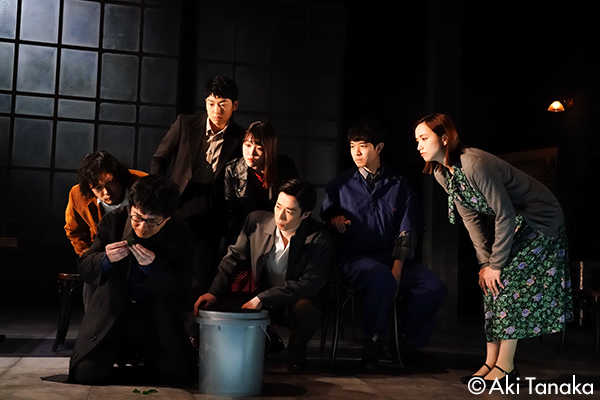
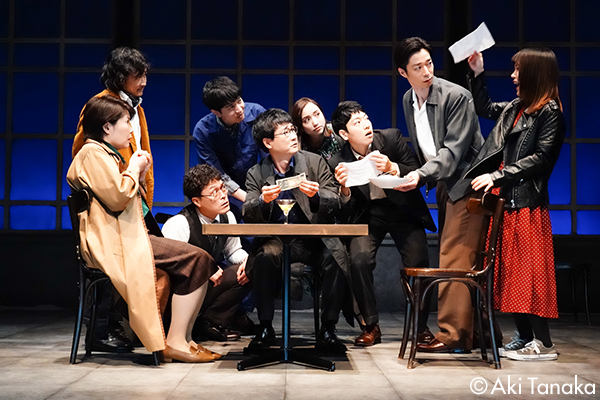
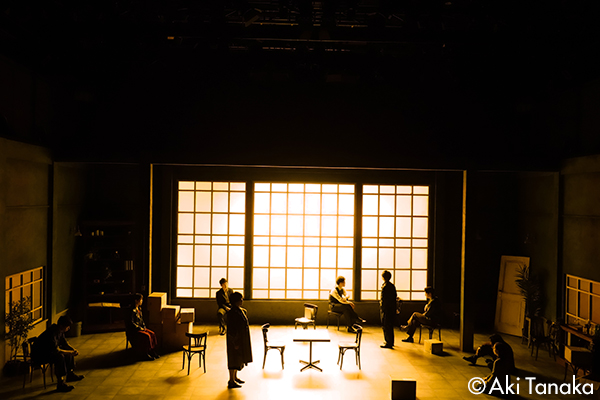
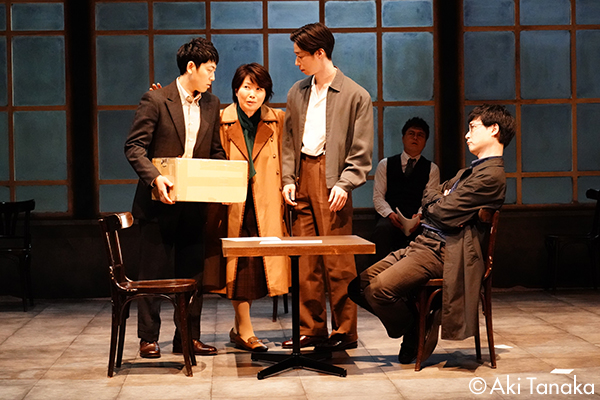
Ikiume Soto no Michi
(May. 28 – Jun. 20, 2021 at Theatre Tram)
Photo: Aki Tanaka
Data
:
Premiere: 2021
Soto no Michi (The Outside)

Photo: Akihito Abe
Playwright and director Tomohiro Maekawa was born in Kashiwazaki, Niigata Prefecture, in 1974. After graduating with a in philosophy from Toyo University, he founded his theater company and the base for his activities, Ikiume, in 2003. His unique style incorporating elements of science fiction, philosophy, and the occult has attracted much attention and acclaim.
Internationally, productions of his work are increasing. Maekawa’s work was performed in Seoul by Korean actors, first in 2019 with Strolling Invader, followed by The Sun in 2021. When The Sun was then restaged at the National Jeongdong Theater in 2023, a dance piece of the same name was also performed.
In 2021, Ikiume staged À la marge in Paris to critical acclaim. In recent years, his plays continue to be published in a variety of languages, including French, Korean, Spanish, English, Russian, Arabic, and Chinese.
Maekawa has won several prizes in Japan, most recently the Excellence Award at the 31st Yomiuri Theater Awards for To Deliver a Soul, which was staged in 2023. (Updated April 2024)
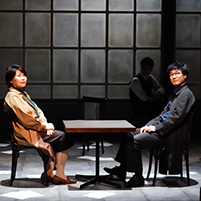




Ikiume Soto no Michi
(May. 28 – Jun. 20, 2021 at Theatre Tram)
Photo: Aki Tanaka
Data
:
Premiere: 2021
Scene 1
The set is a café-like hall with one wall a full picture window. Beyond the window is a scene like any common country town, or perhaps a desert? From somewhere in the distance is heard an ominous sound that is called the “ringing of the sky.”
There are some customers, but they are simply seated and unmoving.
In this shop, occurs a chance meeting of former friends Mitsuru Teradomari (male) and Mei Yamadori (female). The two are former classmates who went to elementary and middle school together. As they chance to meet for the first time in 20 years, they learn that they have been living in the same town unknown to each other.
Mei is divorced, having moved to this town ten years earlier with her younger brother, Shiro, to care for their mother, Seiko, who was recovering from a brain tumor. She works as an assistant to a notary public.
Mitsuru moved to this town three years ago in response to his wife Yoko’s dream of living a rural life in the countryside. He works as a delivery service driver. Yoko runs a small florist shop she opened by converting a section of her home.
After updating each other on their current lives, they become silent, finding nothing to reminisce about from their younger days long ago.
The fact is that both of them have run into dead ends in their personal lives.
Mitsuru is afraid that his wife is having an affair, which makes him feel that their married life is ruined. Mei hints about the regrets she has about things that upset her life.
Mei finds herself having to listen to Mitsuru’s story of discontent like a patient life consultant.
Scene 2
Mitsuru’s story.
A political rally that Mitsuru’s company organized for a particular politician led to a strange encounter for Mitsuru. At the ensuing social gathering afterwards, the politician died of a stroke, and in the autopsy, it was found that a fragment of glass from a beer bottle was lodged in the politician’s head. The fact that Mitsuru had by chance broken the same type of beer bottle at the party led Mitsuru to harbor the strange suspicion that it was in fact a glass fragment from the same bottle that had caused the politician’s death.
Then he begins to speak about a particular coffee shop in the town called Milton. The charismatic master of that shop is a well-known magician with an avid following of fans. Invited by his younger brother, Mitsuru finally went to see the master’s magic show.
Mitsuru is shocked to see the master’s amazing acts of magic. Among them all, however, is one where he causes a coin to pass through the glass of a jar as if he has veritably made matter permeable. Thinking that it might be such a means that caused the glass fragment to enter the politician’s skull, Mitsuru becomes obsessed with the idea that the master might have been at the politician’s party that night.
When Mitsuru asks the master about the trick behind that magic, he replies: “In fact there is no trick or device involved. It simply uses a mechanism that already exists in the world. When seen at the atomic level, all matter has spaces in it. It simply passes through those existing spaces. It is a matter of understanding that structure and having the ability to see it.”
While ruminating on the magician’s words, Mitsuru becomes more affected by them.
Scene 3
Mei also begins to talk about what troubles her.
Due to her brain tumor, her mother Seiko suffered memory loss and personality disabilities, and today she remains trapped within her memories from the age of 17, believing that is still her actual age.
On the morning of the day that the “ringing of the sky” that began in the city first came to be heard in this country town, Seiko pointed to a neighboring house a second floor window of their home and complained that she could see a strange black mass in it. At the time, neither Mei nor Shiro could see it, but by now Mei has come to see it, too.
Mitsuru tells Mei that now he has come to see it, too. Mei is happy to learn that Mitsuru see the same thing as her. Mei begins to talk about the black mass that has been worrying her.
Scene 4
Mei’s story.
One day, a cardboard box with the single character mu (nothingness) printed on it as the product name was delivered to her home. When she opened it, there was nothing inside, it was empty. But before long she began to sense that nothingness beginning to encroach on her room, permeating it with a darkness she could see, which allowed no light into its realm as it spread around the room.
And before long, that dark nothingness enveloped her entire room. Being there felt like everything had turned to nothingness. But since it was her own room that she was used to living in, she decided to adapt her mind to it and found that she could grope her way around and, for some reason, the furniture became meaningless and even the walls disappeared into nothingness. She might scream or walk or run, but she arrived nowhere. Cast as she was into thin air, Mei was overwhelmed with the sense that all that remained of her was her consciousness.
Night became morning and when she awoke, Mei found herself standing naked on the top of a building in the neighborhood. When she headed back to her room, she found that the nothingness had spread beyond her room. More than half of the home was covered in the darkness.
All that Mei could do was use her memory to feel her way through the nothingness of her room. But, by using her imagination, she was able to recreate an image of her familiar home and bring her room back into some form of existence.
In the darkness of her home, there now appeared a youth, who calls himself San-ta. This San-ta doesn’t really know who he is. He keeps saying, “When I became conscious, this is where I found myself.” Mei thinks he is an unlawful intruder and calls the police.
San-ta checks the identification papers, the graduation album and the diary in the cardboard case he is carrying and starts claiming that he is Mei’s son. The police believe San-ta and Mei is left in a state of confusion.
Mei goes to her boss, and lover, Hibino, to ask what to do. The notary public official Hibino promises to look into the legal facts of the situation. Mei decides to leave her home enveloped in darkness and the stranger there who claims to be her son.
Scene 5
With his sense of reality now changed by his encounter with magician master, Mitsuru is able to accept Mei’s absurd story as she has told it, and Mei is glad that he has believed her.
With his newly changed perception of reality, Mitsuru begins to talk about the troubling fact that his wife now appears so beautiful to him that he can’t believe she is the same person.
Mitsuru looks back through his old photographs and realizes that she was in fact that beautiful from the beginning. Mitsuru is excited by the feeling that he has found “new eyes and a new way of seeing things as they are.” The overwhelming impact of the visual inflow of everything that his eyes perceive, as if now seeing the world in higher definition, literally makes Mitsuru convulse and vomit.
With these “new eyes” he has acquired, Mitsuru begins a steak of deviant acts. As if in defiance against common sense and the system, he repeatedly makes deliveries to the wrong address.
Concerned about his brother’s mental condition, Mitsuru’s younger brother Tadashi recommends a hospital he should visit. Mitsuru refuses to listen, saying that, “There is no beauty in the systems that human beings have created after the pre-existing ones. People can achieve happiness by understanding the systems that have existed in the world from the beginning.”
Meanwhile, Hibino has reported to Shiro on his investigation into San-ta’s identity. It appears that San-ta was adopted by Mei a few years ago, and the documentation is authentic and legal authorization exists. Hibino doesn’t know why neither of them have any recollection of San-ta, but he recommends that they accept him in accordance with the documentation.
Seeing the way San-ta is dutifully caring for Seiko with no reluctance, it appears that he has already become part of the Yamadori family.
Mei is at wits’ end when she hears that Hibino has verified that San-ta’s documents are authentic. Before leaving, Hibino tells her that he believes in her, but that he simply doesn’t know how to explain the existence of the documents.
Santa tells Mei, “I found out from the documents who I was. Nobody around me doubts that this is who I am. I’m content as long as I have a place where I belong.”
Everyone besides San-ta and Mei themselves believes what the documents say and are resetting their memories in line with that, Mei believes. Mei says that she has decided that if what San-ta told her at first is true—that he had just found himself here when he became conscious of himself (and didn’t remember anything prior to that)—then she should just believe what he said and start from there. The past that is written in the documents doesn’t matter. And if that is the case, she thinks she may be able to accept San-ta as he is.
Mei realizes that everyone starts out in the same way: just finding themselves where they are when they become conscious of it, so it is stupid to get caught up in worrying about the past or the consistency of documents. Mei decides to burn and get rid of San-ta’s identity documents as well as here own. Remembering the morning when she woke up on the top of the building, she declares, “We were all born from nothingness.”
Mitsuru has been fired by his company, he has begun delivering cardboard boxes with the character mu (nothingness) on them and his family has begun looking at him as a madman.
Since losing her belief in any documents or written records, Mei has quit her job at the notary public office and stopped going home as well.
Now having come to deny the systems of society, Mitsuru and Mei now have no place to be, and they find themselves at the café laughing together in a self-deprecating manner.
The two had come to find themselves losing any sense of order in the world. The darkness out on the streets has continued to grow and meld together to the point that it is enveloping the entire town. And from this huge mass of darkness sounds that ominous “ringing of the sky.”
With no place left for them in this society, Mei and Mitsuru have decided to leave it. When they do, everyone in the café begins to whisper at them, “You’ll die, you’re going to die, certain death awaits you.” That whispering rings in their heads like a curse, and it grows and grows.
Having found that they are each other’s only confidents, Mitsuru and Mei try to shake off the voices and leave the café. At the same moment, the ringing of the sky reaches a thunderous climax, and suddenly everything goes completely dark.
The two are thrown out into the world of nothingness, and all that remains is their consciousness. And as even that consciousness seems to be on the verge of being scattered and lost, Mei recalls how she previously used her imagination to reconstruct her room out of the darkness. Mei encourages Mitsuru to hold on, as he seems on the verge of collapse.
“We can make something out of the nothingness, with our imagination,” she says.
Mitsuru answers that call. “We might as well make something completely new, and more beautiful, too.”
The two begin imagining a new world. And then, the sunlight returns.
Related Tags